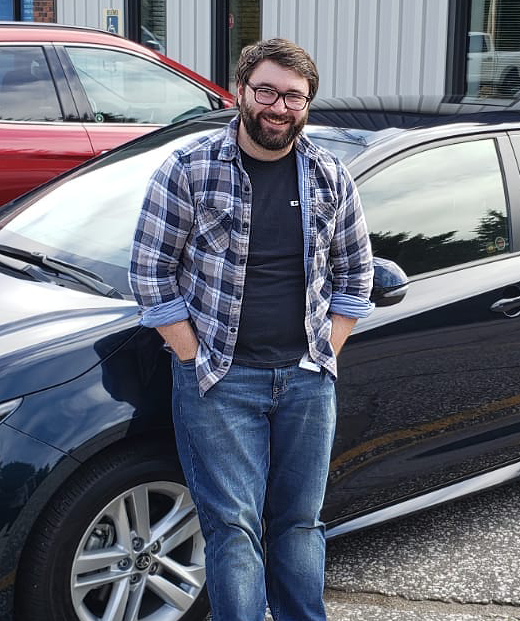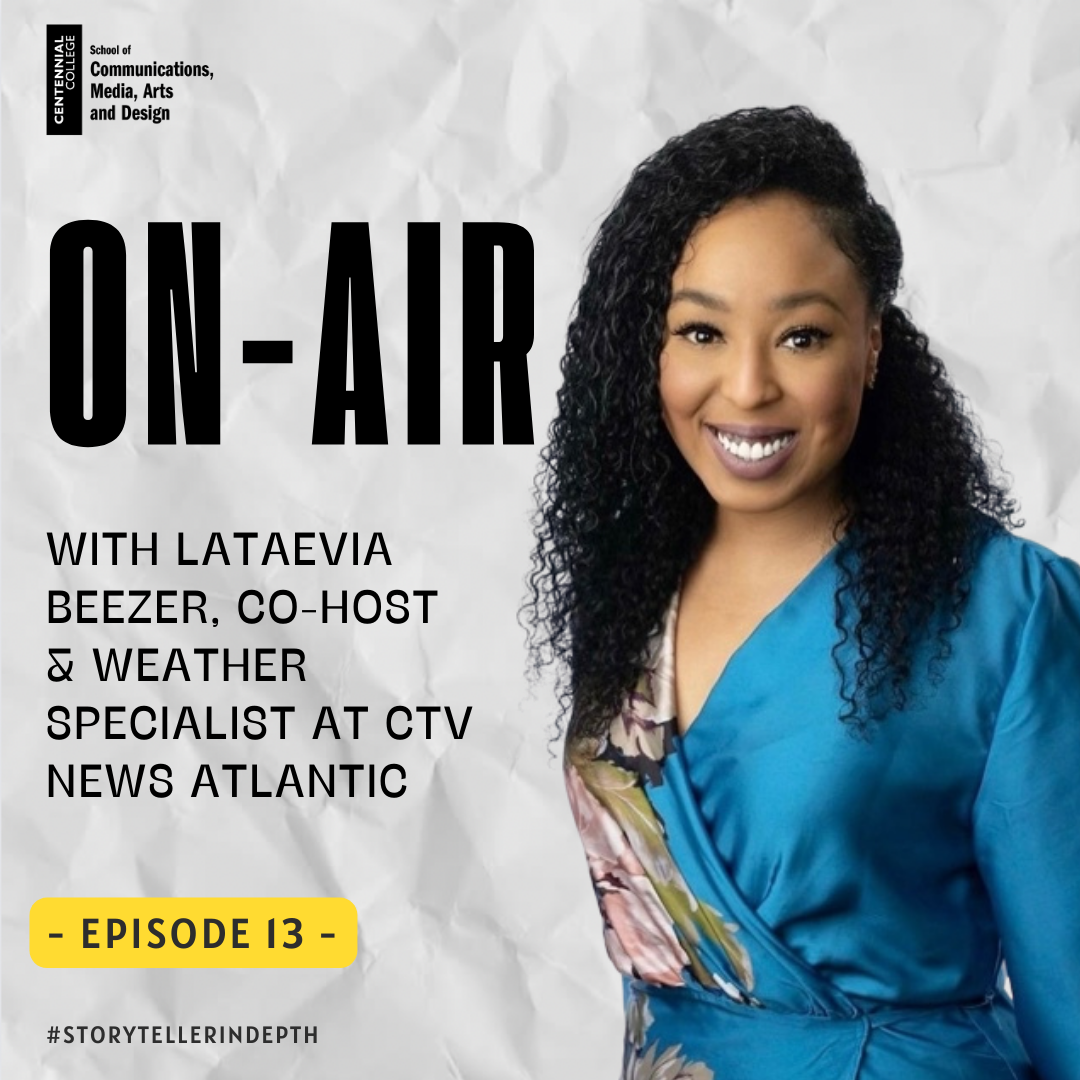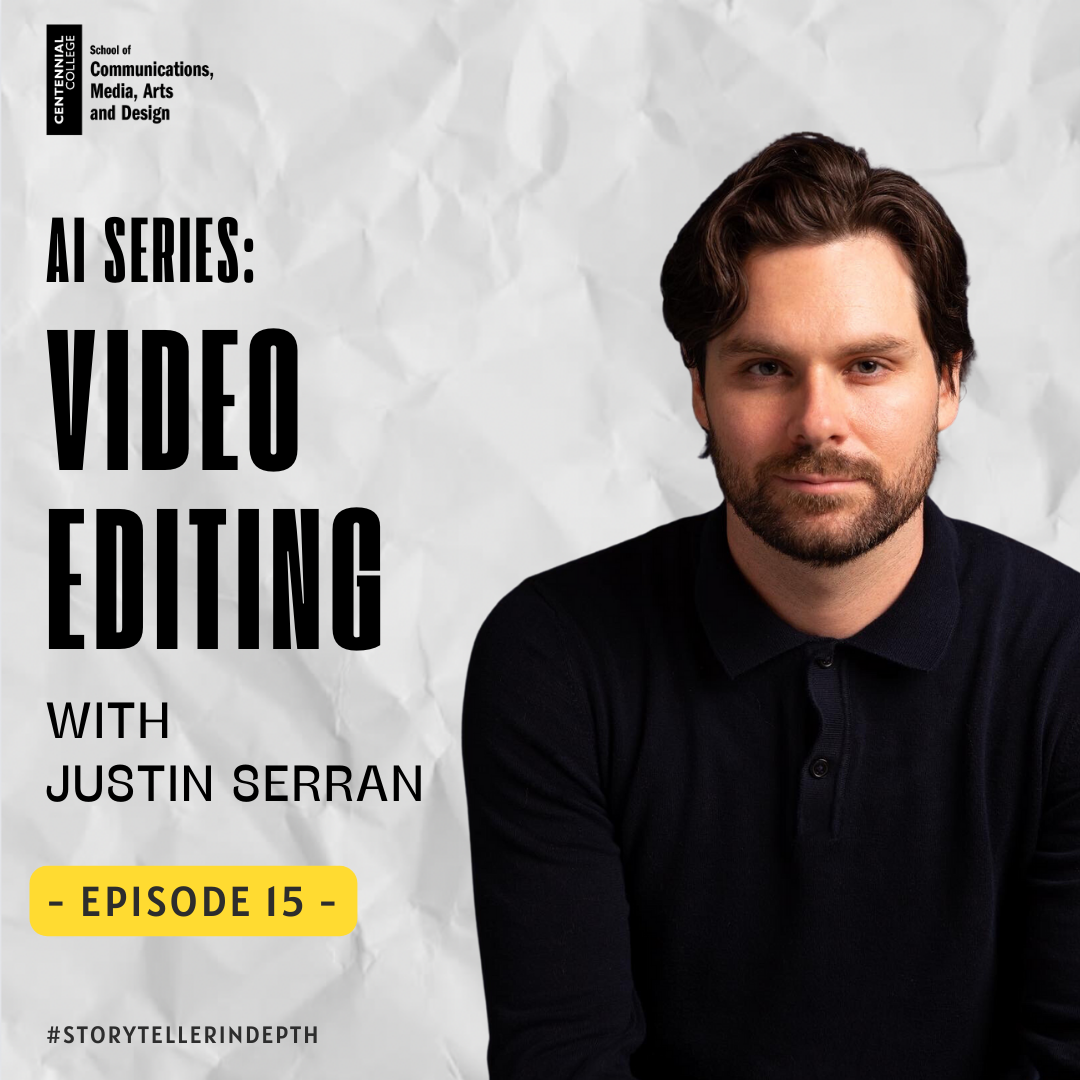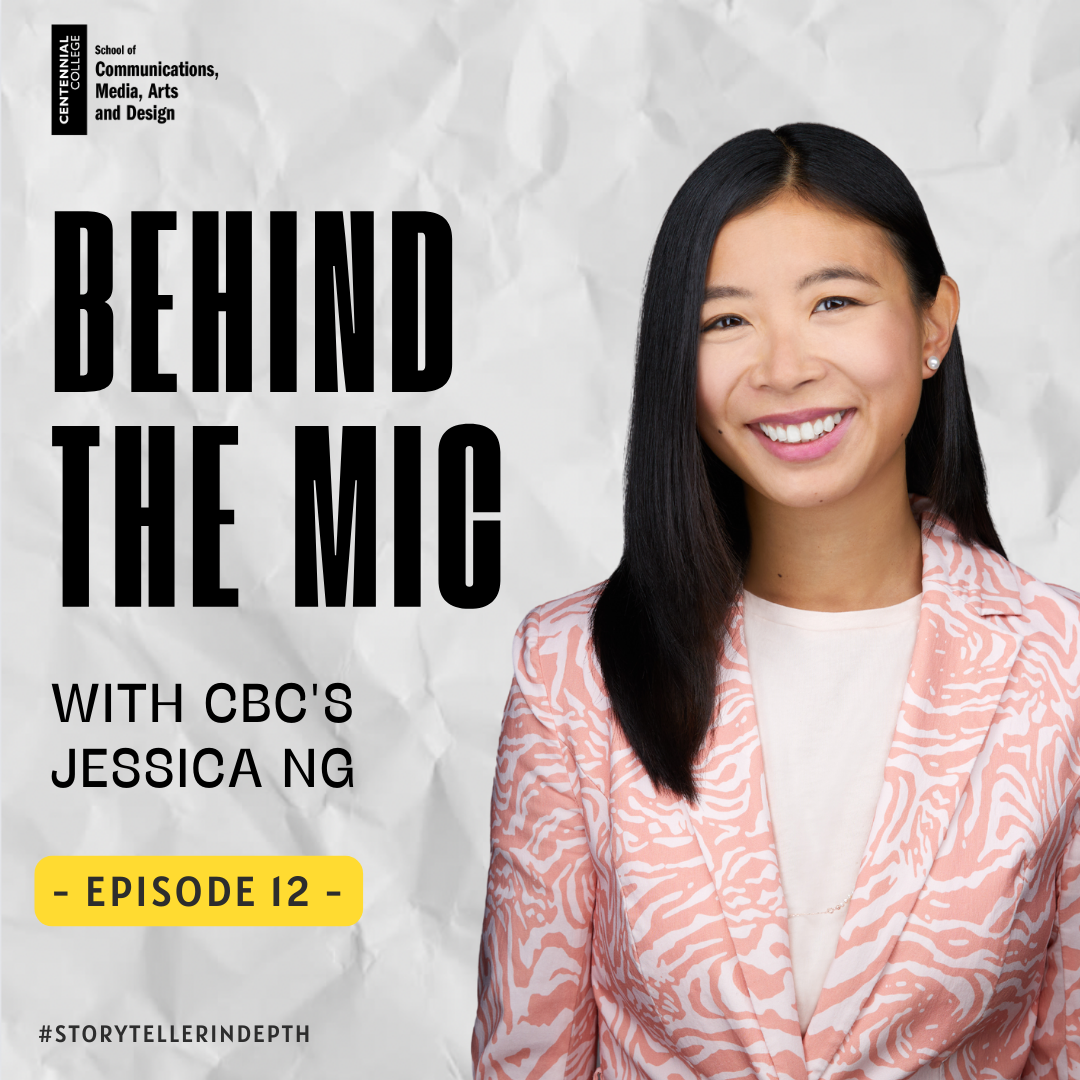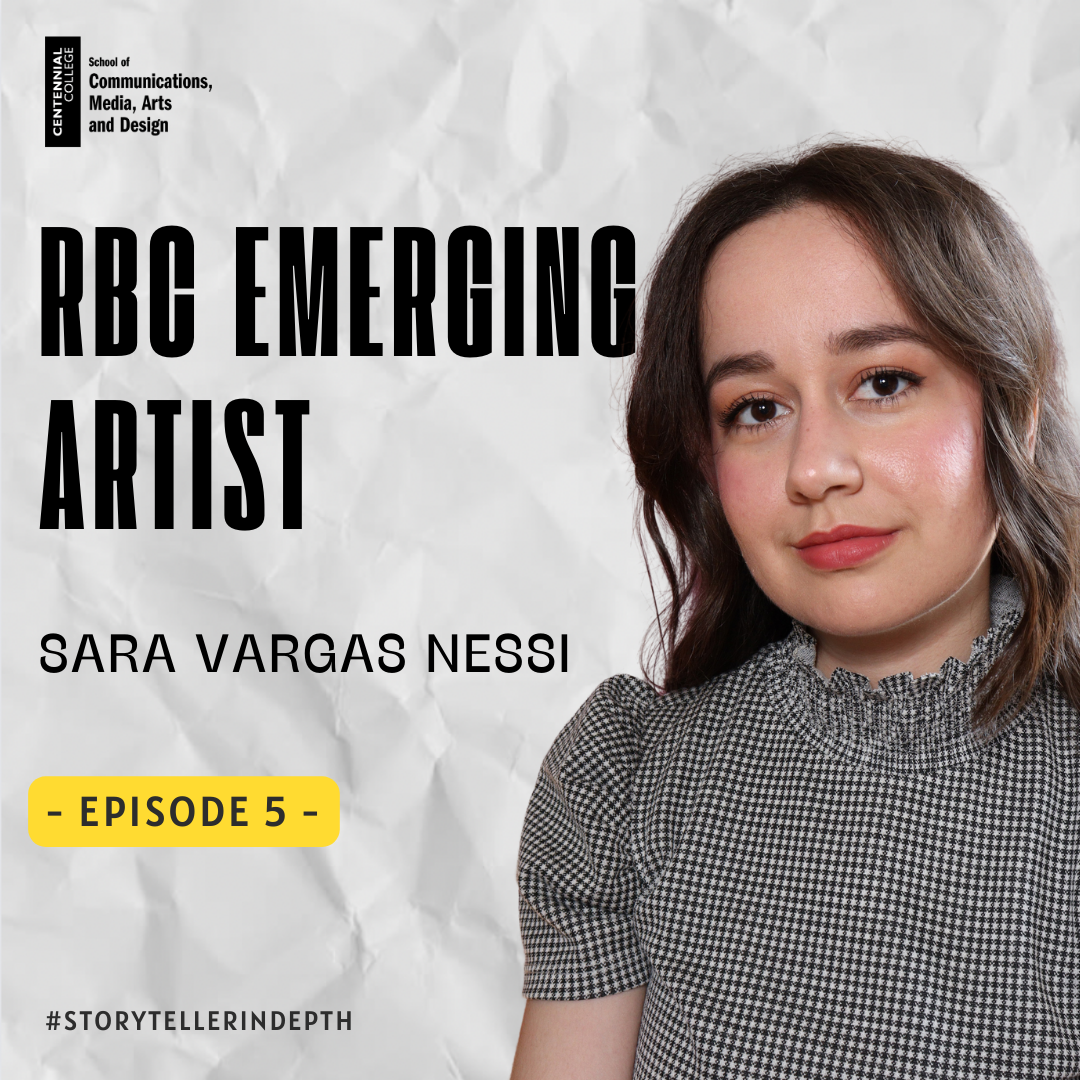Episode Transcript
Speaker 0 00:00:00 Hello and welcome to Storyteller in Depth, a podcast where we go behind the scenes to learn more about the School of Communications, media Arts and designs, people, places and things. I'm your host, pat Quigley, and today we're diving into the world of live television. There is so much that goes on behind the scenes that as a viewer, we might not fully understand the extent of, to help give us more insight and to share her journey in this industry. We have Latvia Beezer, a morning co-host and weather specialist at C T V Morning Live and the host of her very own horror series. The Bite with lc Latvia, will be sharing some great insight and advice, so you do not wanna miss this episode. Thank you Latia, so much for being on the podcast today.
Speaker 2 00:00:54 Absolutely a pleasure. Thank you so much for having me.
Speaker 0 00:00:56 Of course. It's great to, to get down to chat and to find out all about you and, and, and talk about all this kind of stuff. So, yeah. Um, but you know, before we begin, can you tell us a little about yourself, uh, where you're currently working and some of the roles you have taken on throughout the years?
Speaker 2 00:01:12 Yeah, of course. So, I'm born and raised in Toronto, and I moved out originally first to Prince Albert Saskatchewan to start with CTV News. I was the community reporter there. Uh, so I did a lot of pre-taped segments, uh, community reporting. We had a few weekly and monthly segments that I would pre-record there. And then from there I moved on to Ctb Morning Live, Regina, where I became the weather host. Um, I stayed there for a little bit and then I was quickly promoted over to the East Coast where I now work in Halifax for Ctb Morning Live Atlantic. I'm the co-host of the Morning show, as well as a weather specialist. So many different roles over the last four years.
Speaker 0 00:01:57 Yeah, no kidding.
Speaker 2 00:01:59 <laugh>.
Speaker 0 00:02:00 And has it been fun?
Speaker 2 00:02:02 Um, a lot of fun. Some days a little difficult and a lot of juggling and wearing many hats, but overall, definitely worth it.
Speaker 0 00:02:11 Yeah. And what about the early mornings? Are you still a fan of mornings or are you getting tired of them?
Speaker 2 00:02:16 <laugh>, before working with C T V Morning Live, um, I was definitely a night owl. Uh, I don't feel like after doing morning shifts for three years, you still don't get used to waking up that early. But I, I prefer it because I'm usually out of the station by one o'clock, so I just have to get there by four. I'm usually in the, in the station by four 30.
Speaker 0 00:02:42 Wow. Yeah.
Speaker 2 00:02:43 That's very early <laugh>.
Speaker 0 00:02:44 No kidding. I always had a thought in my life that I was like, maybe I could do morning shows because I'm such a a morning person that I think I could make that work.
Speaker 2 00:02:52 It's a lot of coffee. A lot of coffee. <laugh>.
Speaker 0 00:02:55 Oh, I'm sure. Yeah. Yeah.
Speaker 2 00:02:56 <laugh>.
Speaker 0 00:02:57 So, as someone who's worked in various roles, roles within this industry, what key lessons have you picked up on from each of them along the way that have benefited you to today?
Speaker 2 00:03:06 Oh, um, definitely just making sure that you're always driven. So you're constantly learning. You're never really settled in one position and one daily job. 'cause we wear many hats as journalists as you know. Um, just making sure you're forever trying to grow and be the best journalist that you can be. I think that's the key l like lesson that I've learned throughout all of these positions. Um, you kind of have to be able to switch gears and really change it up. When I started journalism, even just within school, I wanted to be an entertainment host, and I think as the positions became available, it shifted. I never ever saw myself doing weather, and then here I am, you know, three years later still doing weather and loving it and learning and growing within that. Um, I think another lesson that I've learned along the way is just making sure that you're always staying up to date with the way media is changing.
Speaker 2 00:04:10 Uh, whether that be social media, new apps that come out, or finding new ways to share your medium. I think that's something that's very important as well. And just basically patience. I think that's something else that I've learned along the way. It's so hard to actually break into the industry, and I think that's something we're taught in school, but you don't realize how many people don't actually make it how hard it can be to retain your career and your position in media. And I think that's just something I've learned really along the way is give yourself grace and also just be extremely patient because you really, you can set out a goal for yourself and kind of a timeline of how long you wanna achieve things and when you wanna achieve them, but it really doesn't fall that way. <laugh>.
Speaker 0 00:05:03 No, not at all. Not at all.
Speaker 2 00:05:05 <laugh>
Speaker 0 00:05:06 You always think, you always think, you're like, I'm gonna go this way. Everything's gonna work out perfectly. And then you turn around, you're like, oh, I didn't expect this thing to happen.
Speaker 2 00:05:15 Exactly. It's kind of like when you're in school, you think you're like, top dog. You're like, I'm gonna make it. It's just gonna happen. That's what it is. Yeah. And I'm gonna be the exception. And then it took me years after graduating to actually nail an on air job. I did many other jobs behind the scenes before I made it to C T V and being a VJ and then a community reporter and a weather host. And yeah, it took a long time. And I think that's something that really humbled me after graduation was like, oh, you know, maybe I'm not as good as I thought I was, or maybe I need to work on this, or How am I gonna make it if am I gonna make it? I think that was a lot of the questions that I had to really sit with for years.
Speaker 0 00:05:59 For sure. Yeah, I mean, I, there, I've, I've worked with co-ops and interns a lot and you know, just, they're like, oh, well I'm gonna break into the industry really, really easy. And I go, well, yeah, be easy on yourself. Don't expect it to happen right away. Yeah,
Speaker 2 00:06:15 Exactly. And even with me, like when I did my internship, I did four internships before I, I officially graduated from Centennial because I went, I did some other schooling before too. And when I was outta school in between programs, I did more internships just to keep myself like really well versed in the profession and what was going on in the industry. And yeah, like I graduated with an a after in Centennial with an internship and I didn't get hired afterwards, you know what I mean? So it's just kind of one of those things where like you really have to roll with the punches.
Speaker 0 00:06:50 Oh, 100%. That's a great advice for everyone. Yeah. <laugh>. So take us through your role today as a morning show, co-host and weather specialist at C T V Morning Live. Uh, what are some of the daily responsibilities that look like for both roles and is there something viewers watching you on their screens might not know about the elements that go into hosting or reporting on the weather?
Speaker 2 00:07:12 Oh, that's a good question. Um, I think, well, first of all, I get into the studio at 4:30 AM My shift technically doesn't start until a half hour later. Um, but I, because I, I do weather as well as co-hosting, I have to make sure that I'm building the weather story of the day, looking into the, the next couple of days in the week I cover what's different about covering weather in the East Coast is I cover four Atlantic provinces, whereas in Regina I covered one province, right? And then kind of overshadowed across Canada what some of the highlights of the forecast would be for that day. Um, so I spend a lot of my morning really building the weather story and kind of making sure that I'm covering as much as I can, especially because weather is very different in Atlantic Canada as well as across four different provinces.
Speaker 2 00:08:04 So just making sure that the weather graphics are up to date. I am telling the best and concise weather story of the day, and then I go into the scripts of the day, like, what am I reading? What am I working on in terms of, you know, getting back to viewers or picking out our C M L check-in, which is something we do every day where we ask a question of the day and we pick out photos to highlight from our viewers or answers. And, um, behind the scenes during the show, I'm making sure social media is up to date for our accounts. Uh, Facebook, Twitter, as well as, um, Instagram. And besides that, after the show, I, I do do interviews during the show as well, so we prep those after the show in order for the next day. And then between, yeah, between the show ending and me leaving, I am doing Pret tapes. We're doing radio pre-records, just kind of teeing up what's coming on the show the following day, and writing interviews, chasing new interviews. Uh, if, if, uh, I do a monthly horror segment called The Bite with lc. So if I'm working on that that month, I'm either preparing new interviews to do so I can kind of schedule the following month of what's coming up on the show, or I'm editing the content and yeah, writing a blog every day. That's pretty much the gist of my daily schedule. <laugh>, yeah,
Speaker 0 00:09:34 Just, just a little bit, you know, not, not too much, not too much to get over, you know, encumbered or anything like that. <laugh>.
Speaker 2 00:09:40 Exactly. <laugh>. Yeah.
Speaker 0 00:09:42 And you talked about a little bit of the, the Bite with lc. Can you tell us how that began and what your favorite parts about hosting that series are?
Speaker 2 00:09:49 That is my love language in journalism, <laugh>. So basically, I am obsessed with horror, and I always have been. I used to go to Tiff and go to the midnight Mass just to go see the horror releases that would air during Tiff. Um, and I started just asking questions, doing interviews, kind of on my own freelance work and just, just doing what I love on the side. So when I got to C T V Morning Live Atlantic, I decided to pitch this idea, and this was like a little over two years ago, and thankfully my manager and my news director was like, you know what? Yeah, let's do it. And ever since then, I've been airing it every month. It's been awesome. I put it all together myself, so I write it, I chase the interviews myself. Um, I'm always, you know, doing the research to find out what movies are coming out or what I can, how I can dive deeper into the horror genre and really kind of expand our viewer's knowledge of horror, because, you know, not everyone likes horror or doesn't like scary movies or knows a lot about the industry.
Speaker 2 00:10:58 So for me, it's definitely my love language and just a great way to show my creativity and my niche.
Speaker 0 00:11:06 Well, especially when you're doing, when you're working in a creative field, right? Sometimes you need to find those outlets to continue to be creative in your own way. And this sounds exactly, this sounds exactly what that is, right? Yeah.
Speaker 2 00:11:18 Like I know in school that the biggest thing that they taught us is kind of like, find your niche and really hone in on that. And for me it was always entertainment. Uh, but I think as I got into the industry, it, it's very hard to like find your niche if you are given just a role, right? Like you're applying for a role because you wanna be in the industry. And thankfully I fell into something that I really do love, and I am expanding on my education and my knowledge of weather and forecasting. But this is just something that I absolutely love on the side, that I'm so grateful that I was able to bring to C T V and kind of switch gears a little bit and share my passion.
Speaker 0 00:11:59 That's incredible. And I'm, you know, congratulations on that. Thank you. Not many people get to say they get to do that, right? So it's,
Speaker 2 00:12:06 It's, that's so cool. Considering it's a news platform, it's really awesome that I get to share horror <laugh> and my love of horror with
Speaker 0 00:12:14 <crosstalk>. For sure. Um, what are some of your go-to tips for someone who is interested in venturing into hosting, but may feel some nerves associated with it?
Speaker 2 00:12:25 Definitely continue to hone in on your craft. So whether that be further educating yourself, uh, practicing at home, uh, building up your confidence. I think that's a really big thing. I feel like when you get into the industry or trying to get into the industry, sometimes that can kind of waver just because you're, again, you're going up against so many talented people in the industry across Canada. Uh, you're fighting for jobs that, you know, with the best of the best in the industry. So I think it's just kind of making sure that, you know, that you bring something different to the table and really having faith in your own talent, I think don't compare yourself to others, because we all have something different that we bring. And as long as you are practicing what you love to do, um, continuing to do it outside of work.
Speaker 2 00:13:18 Like I said, I did four internships before I got into the field. I did a lot of freelance work and a lot of, you know, donating my time just to make sure that I could be the best that I could be. And still, when I got into the industry, I still was not as good as I can say I am today, because you learn along the way. So I think that's where that confidence and that grace really comes into play because you're going to learn, you know, and you were given the tools and skills through school to get you, to get you to where you wanna be. And then through your profession, you're really gonna develop those extra skills to, to kind of maintain you and help you to grow as a journalist in the industry.
Speaker 0 00:14:04 For sure. And that's some really, really good advice for, for people who are interested in doing that. Right.
Speaker 2 00:14:10 It's hard, but definitely don't give up. That's what I would definitely tell someone who really wanna be a journalist.
Speaker 0 00:14:17 Yeah. I don't know, I don't think I asked you that. What got you interested in wanting to be on camera and do interviewing and, and be, you know, on camera and do this? What,
Speaker 2 00:14:29 What inspired you? I was always <laugh>. I was always into performing arts. Um, I used to do like singing in Toronto and then I did a bit of acting, but to be honest, like my love of films, my love of like, just all kinds of mediums, I think it just really inspired me to be a little more practical and wanting to tell other stories. Um, I think that's when I reached like my teen years where I was like, okay, maybe, you know, acting's really hard. Journalism will be a little bit easier to get into. I was wrong <laugh>, but that's what my thought process was like at like 17, 18 years old. Um, and then, yeah, just kind of ran with it and kept chasing it ever since.
Speaker 0 00:15:12 No kidding. <laugh>. So your, your career has taken you on such an exciting journey from Toronto to Saskatchewan and now to the East Coast. What have been some of your favorite parts of your career and maybe something you didn't an anticipate going into?
Speaker 2 00:15:26 Um, I think a lot of the fun things that I've been able to do that I never thought I would be able to, like horseback riding on air or dancing or just doing the silliest of segments on our, on our show right now, c d b Morning Live Atlantic, the ladies and I, uh, we do c m l game days. I've done eating competitions, we've done bobbing for apples, we've done dancing. It's just, it's just wild. I think being, working on a morning show, you never know what to expect. It's so much fun, especially when you have really great hosts to work with and a really great team behind, behind the scenes. So I think one thing that I didn't, I didn't really expect to travel so many different places in Canada. Like I knew in school they told you like, be prepared. If you really wanna make it in the industry, you may have to leave Toronto.
Speaker 2 00:16:14 And I knew, always knew that I was prepared to leave, but it's just been exciting 'cause I've never really like traveled across Canada before, like maybe one or two places, but not lived anywhere different. And you get to really see different cultures and how different different parts of Canada is. And I think that I was a little bit naive to that, just living in this, in a big city my whole life, you kind of just think everywhere's the same. You don't have the t t C anywhere else. And you know, what if it snows a lot of the time you can't get a bus in Saskatchewan or in the East Coast. So it's very interesting to see how different places operate, but it's been so joyous to really be able to share this with my family and my husband and traveling all across Canada. It's been fun.
Speaker 0 00:17:05 Oh, for sure. And I, I know what you mean by that. 'cause I got the opportunity to go to Thunder Bay and Winnipeg and Victoria and a bunch of other places with, with my work and, you know, just getting to experience all these different places that you never thought was going to happen. Right. Absolutely. And your job takes you to such this cool thing that you get to brag about later.
Speaker 2 00:17:27 Exactly. You get to look back later and be like, wow, I can't believe I did all this stuff, or I lived all these places.
Speaker 0 00:17:33 For sure. You have experience in writing articles for publications, and now you're sharing stories in a hosting role, both forms of storytelling, uh, just through different mediums mm-hmm. <affirmative>, are there some connections between the two?
Speaker 2 00:17:48 Um, I definitely would say there is a connection in terms of doing your research and building the focus of your story. Um, definitely writing articles, you're a little more, um, like theatrical with your words at times, depending on what kind of story your article you're writing. Uh, but with On Air it's a little different in terms of it's ever changing. So you can have your, you know, you've done your research on the person that you're interviewing or the topic that you're covering and you've written your questions and then all of a sudden either the prompter dies, so you gotta go with the flow, or you're listening to the what the person is saying, and it kind of switches gears, right? So you base it off, obviously the knowledge that you have and the research that you've done, but you, you definitely have to pay more attention to the person that you're talking to.
Speaker 2 00:18:39 And I feel like that's when you get more heartfelt responses, but also just get the best version of the story to tell. Um, I think a lot of it too, you have to be really prepared to listen. I have a I F B in at all times, right? So I have my director talking to me as well as the person that I'm listening to talking to me and controlling the prompter, right? So there's a lot of different levels of, to what you're doing. And I think key thing is communication and understanding that you have to be able to multitask because things change on the fly. <laugh>.
Speaker 0 00:19:15 Oh, for sure. Yeah. Especially if there's like, you're, you're having a, a fun conversation with somebody and then you're like, oh, by the way, there's a storm coming in on the east front and what's gonna happen? How do we swing to that next?
Speaker 2 00:19:26 Exactly.
Speaker 0 00:19:28 Right. Um, so we're gonna switch gears a little bit. You're a graduate of the Journalism Advanced Diploma Program at the School of Communications Media Arts and Design. Uh, would you, what would you say are some of the key lessons you picked up in the program that you continue to use in your career today?
Speaker 2 00:19:44 Uh, I loved my time at the Story Arts Center. It was so much fun. Uh, the classes were pretty epic. I think the television class was like my number one favorite, just learning how to do the prompter. Obviously prompters changed since I went to school. Now we really controls things on our own, whereas when I first started in the industry, a lot of it was controlled for us. Um, but even just building a story, that was the key learning that I learned at Centennial. Like, just being able to figure out how to build a story, uh, how to write grammatically, and just making sure that your delivery of a story is perfect. Editing was key, and that's all those skills I learned, I learned then I use today. And even though the editing platforms may change and we're constantly switching gears, editing on an iPad or your desktop or what have, what have you on the fly, um, I think a lot of the key lessons at Centennial really set me up for success now. Um, we still use CP style. We still make sure that we're putting together a story in basically the same formats. Um, but I think one of the biggest lessons I learned was being open to shifting gears and making sure that you're able to adjust. I can't really stress that enough because that is what is what my professional career and my career as a student really taught me. And that's something that has stayed consistent in an ever changing industry.
Speaker 0 00:21:17 Yeah. Especially with so many things within our industry, changing daily, weekly, monthly with social media, with ai, advancements, with
Speaker 2 00:21:27 Oh my goodness, yeah.
Speaker 0 00:21:28 Everything, right? Like, who knows what the next five years is going to look like in, in the media landscape in Canada.
Speaker 2 00:21:36 Exactly. It's, it's a little scary, but mm-hmm. <affirmative> keeps things interesting, I guess, <laugh>.
Speaker 0 00:21:42 Yeah. Where do you see like some of these things changing within your line of work right now in, in a morning show?
Speaker 2 00:21:50 Hmm. It's kind of, I don't know. It, it, we have obviously at C T V News, a heavily focused on, um, video and online presence for sure. Uh, it's, it's kind of hard to tell because, you know, television one would say is a dying media. However, uh, people still tune in. People are still looking at getting their information in so many different ways and consuming that information, whether it be online and on tv, or getting, you know, watching the show afterwards. So I think the important thing as a journalist is to continue to wear many hats and to continue to strive to know as many different mediums as possible within the industry, because you never know what's gonna happen and you never know when that day's gonna come. Uh, AI is a very scary thing for many people within media, and we're not sure where that's gonna go, but at the end of the day, I think we just have to be prepared for anything and make sure that we can pivot in any circumstance.
Speaker 0 00:22:55 For sure. Uh, a question we like to ask all of our guests who are in hosting roles is that if you could interview any individual tomorrow, who would be your dream guest?
Speaker 2 00:23:06 <laugh>? This one honestly, was, is a hard one for, for me to answer. I've had so many people that I wanted to interview that I was able to interview through the Bite, thankfully. Uh, like Robert England, who plays Freddie Krueger, my all time favorite horror movie, uh, RL Stein, uh, DJ Mikhale, who did, are You Afraid Of the Dark? Um, I got to interview a Backstreet Boy, which is like forever a goal of mine. AJ McLean, my favorite Backstreet Boy. Um, going forward, if I had to choose it, it's, it's a little difficult. I would say Oprah, uh, the Obamas would be an amazing opportunity. Um, Seth Rogan, one of my favorite comedian and actors, Paul Rudd. There's so many people that I have still on my list that I need to speak to <laugh>,
Speaker 0 00:23:56 And you've still got so much more of your career ahead of you in the future as well, right. So I hope so
Speaker 2 00:24:01 Of time. Hope so. Yeah, I'm hoping so. <laugh>.
Speaker 0 00:24:05 Well, thank you so much for being on the podcast today.
Speaker 2 00:24:08 Thank you so much for having me. Yeah.
Speaker 0 00:24:10 And hopefully we can do this again in another five years or so and, and, you know, catch up again.
Speaker 2 00:24:16 Sounds great. Anytime. <laugh>,
Speaker 0 00:24:24 Thank you so much, Latvia, for being on the podcast. Latvia had such a journey in this industry so far, and her advice is truly incredible. Also, how cool is it that she gets to interview guests for her very own horror series? To our listeners, we'd love to know a topic you'd love to host a series on, leave a comment in this episode's Instagram post. You can find us at StoryArt Center. We have more great episodes on the way, so be sure to stick around for more. See you next time on Storyteller In Depth.
